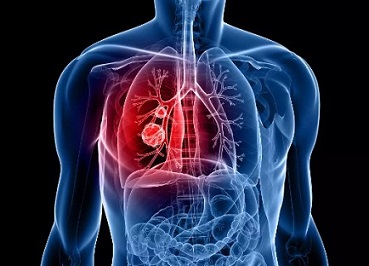South Korean Researchers Warn That Tuberculosis Increases Risk Of Various Cancers
Nikhil Prasad Fact checked by:Thailand Medical News Team Apr 03, 2024 1 year, 10 months, 2 weeks, 2 days, 15 hours, 13 minutes ago
Cancer News: In a new research that is to be presented at the coming 2024 European Congress of Clinical Microbiology and Infectious Diseases (ECCMID), South Korean researchers are planning to shed light on a concerning association between tuberculosis (TB) and various types of cancer. Led by Dr Jiwon Kim from the National Health Insurance Service, Ilsan Hospital, Goyang, South Korea, and Dr Jinnam Kim from Hanyang University College of Medicine, Seoul, South Korea, the study delves into the intricate relationship between TB and cancer, highlighting the increased risk faced by individuals with current or past TB diagnoses.
 Tuberculosis Increases Risk Of Various Cancers.
Understanding the Background
Tuberculosis Increases Risk Of Various Cancers.
Understanding the Background
TB, a bacterial infection that primarily affects the lungs, has long been a global health concern. While medical advancements have made the cure of TB possible, the disease can leave lasting impacts on the body. These include structural or vascular damage, metabolic abnormalities, and an inflammatory response from the host's immune system. Such complications not only affect the lungs but can also manifest in other organs and systems of the body. Importantly, these complications have been linked to an elevated risk of developing cancer.
The mechanisms underlying this increased cancer risk are multifaceted. They may involve tissue and DNA damage, disruptions to gene repair processes, and alterations in growth factors circulating in the bloodstream. Understanding these mechanisms is crucial for identifying individuals at heightened risk and implementing appropriate screening and management strategies.
Insights from the Study
The research team conducted a comprehensive population-wide observational study using data from the National Health Insurance Service-National Health Information Database of South Korea spanning from 2010 to 2017. Their study cohort comprised 72,542 patients with TB, with an average age of 62 years, alongside an equal number of controls randomly selected from the general population. Matching criteria included sex, age, income level, residence, and index year.
Key Findings and Analysis
The primary objective of the study was to evaluate the incidence of newly diagnosed cancer among TB patients compared to the matched control group.
Over a mean follow-up period of 67 months, several significant findings emerged:
-Increased Risk Across Cancer Types: TB patients exhibited a substantially higher incidence of various cancers compared to the general population. Specifically, the incidence rates were 80% higher for all cancers combined, highlighting a broad spectrum of cancer susceptibility among TB patients.
-Site-Specific Risks: The risk elevations were particularly pronounced for specific cancer types, with TB patients facing 3.6 times the risk of lung cancer, 2.4 times the risk of hematologic malignancies (blood cancers), and 2.2 times the risk of gynecologic cancer.
-Specific Cancer Types: Furthermore, the study noted significant increases in colorectal cancer (57% higher incidence), thyroid cancer (56%
higher incidence), and esophageal and gastric cancers (55% higher incidence) among TB patients.
-Identified Risk Factors: Upon adjusting for various confounding factors, the researchers identified several independent risk factors associated with cancer incidence in TB patients. These included current smoking (40% increased risk compared to non-smokers), heavy alcohol consumption (15% increased risk compared to regular drinkers), chronic liver disease (42% increased risk compared to those without liver disease), and chronic obstructive pulmonary disease (COPD) (8% increased risk).
Dr Jiwon Kim told
Cancer News journalists at TMN, "Tuberculosis is an independent risk factor for cancer, not only lung cancer, but also various site-specific cancers, after adjusting for confounders. Screening and management for cancer should be warranted in all patients with TB.”
With growing claims that COVID-19 and even the mRNA COVID-19 vaccines also possibly causing the reactivation of dormant TB in many, healthcare professionals should also pay more attention to the possible rise of more cancers and ensure timely screenings and check-ups.
Implications and Recommendations
The study's findings hold significant implications for clinical practice and public health strategies. The robust association between TB and increased cancer risk underscores the importance of proactive screening and management protocols for TB patients, encompassing not only lung cancer but also a range of site-specific cancers.
Given the heightened risks associated with certain lifestyle factors such as smoking, alcohol consumption, and pre-existing conditions like liver disease and COPD, integrated healthcare approaches that address these factors alongside TB management are paramount.
Conclusion
In conclusion, the study by Kim et al. presents compelling evidence regarding the link between TB and cancer, emphasizing the need for vigilant monitoring and comprehensive care for TB patients. By elucidating the complex interplay of biological mechanisms and risk factors, this research contributes significantly to our understanding of TB-related complications and their broader health implications. Moving forward, continued research efforts and tailored interventions are crucial for mitigating the cancer burden among individuals affected by TB and improving overall health outcomes.
The study findings are yet to be published and are to be presented at the coming 2024 European Congress of Clinical Microbiology and Infectious Diseases (ECCMID).
https://www.eccmid.org/
For the latest
Cancer News, keep on logging to Thailand Medical News.
